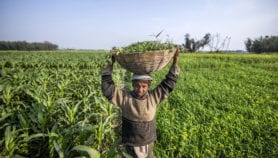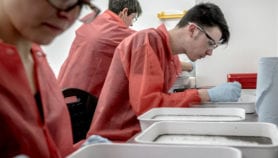Send to a friend
The details you provide on this page will not be used to send unsolicited email, and will not be sold to a 3rd party. See privacy policy.
Tewolde Egziabher argues that a recent report on the use of GM crops in developing countries is too complacent about the potential threats that they pose.
The UK’s Nuffield Council on Bioethics has just released the latest version of its report: The use of genetically modified crops in developing countries (see GM decisions ‘must examine all options’, says report). It is full of useful facts. But it steers clear of many uncomfortable conclusions to which those facts add up.
The report suggests that there is a moral imperative to fund research on genetically modified (GM) crops in developing countries. But if there is a moral imperative, it is in fact in the opposite direction. It is the policy of shifting funds from low-cost sustainable agriculture research towards hi-tech, exclusive, expensive and unsafe technology that is ethically questionable. Indeed, there is a strong moral argument that the funding of GM crops is harming the long-term sustainability of agriculture in the developing world. There are plausible and viable alternatives to GM technology, but these are being ignored and underfunded as a result of the expensive demands of GM research and development.
Secondly, the council also appears to have glossed over the complex issue of biosafety. Instead, its report criticises the application of precautionary principle on which the Cartagena Protocol on Biosafety is based, claiming that a highly restrictive interpretation of this principle “is likely to ignore the possibility that, in some cases, the use of a GM crop variety may pose fewer risks than are implied by current practices or by plausible non-GM alternatives”.
Such a conclusion is unethical on several counts. Why look to GM when we know that there are plausible non-GM alternatives? How can an approach be precautionary if our confidence about safety relies on the fact that a crop “may pose fewer risks”? And, if we are uncertain about whether a GM variety does in fact pose fewer risks, is it not essential to become more careful?
Another disappointing aspect of the Nuffield report is its handling of the issue of patents. It refers to the fact that ‘Golden Rice’ is covered by “70 patents belonging to 32 different owners”. But it fails to address how smallholder farmers in developing countries are supposed to negotiate and pay for multiple royalties. While it gives examples of attempts by some organisations to obtain exemptions for such farmers, this is hardly a solid basis for recommending that the poor smallholder farmers of Africa and the rest of the South be tempted into planting GM crops.
Perhaps more importantly, the council appears to have ignored the biological fact that when a smallholder plants a variety with 70 patented genes, those genes may be passed on to that farmer’s own non-GM varieties. And it fails to mention the implication of Article 34 of the World Trade Organisation’s Agreement on Trade-related Aspects of Intellectual Property (TRIPS) on this biological phenomenon, which would subject the non-GM varieties affected in this way to the same licensing requirements as the GM crop.
The bizarre twist that this adds to the whole process of globalisation is that smallholder farmers could unwittingly become patent infringers. In effect, a GM crop could act as a ‘trawling net’ that placed all a smallholder farmers’ varieties – and thus their lives– under the control of the 32 patent owners! If this is the way to help agriculture in developing countries, perhaps the slave raiding and trading ships of previous centuries should be similarly viewed as helping to ‘globalise’ poor rural Africans!
I would have expected a respectable body such as the Nuffield Council on Bioethics to show great respect for the lives of the poor in the South. I would also have expected to see a statement emphasising that, if genetic engineering is to help farmers in the South, it has to be freed from the patent knots that are effectively making it a global trawling net.
The report does admit that patents on agriculture may not always serve the interests of the developing world. But it does not go so far as to condemn them. If the Nuffield Council truly considers itself to be an authority on bioethics, then it should have a strong and clear position on this.
The author is director general of Ethiopia’s Environmental Protection Authority, and was chief African negotiator at the Cartagena Protocol.
[This is an edited version of an article first circulated on the Gaia Foundation’s email list.]













